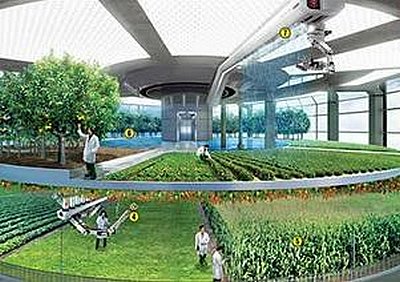Vertical Farming: What are the Advantages and Disadvantages of a Vertical Farm?
Vertical Farming: What is it and what are the benefits of establishing the vertical farm? See advantages and disadvantages of farmscrapers. This is the method of agriculture that has been proposed by Professor Dickson Despommier from Columbia University.
Dickson Despommier feels that there is a great need for inner city blocks to have their own immediate source of food where plants will be grown without soil, by means of aeroponics and hydroponics within buildings already known as "farmscrapers".
Vertical farming may be the only solution to keeping up with the feeding of our growing world's population. Or is it?
What is Vertical Farming?

An Artist's Impression of Vertical Farming
With the over-population of the world ever increasing, and water and land being a finite source, alternative options are being sought for feeding the masses, yet minimizing land use.
How are we going to continue to feed and house everyone? If we need more land for housing, then farmlands and forests will shrink. And yet, one needs that farmland to feed the masses, and the forests to produce oxygen and to sustain other life forms that are all part of the ecology.
So it seemed like a catch-22 situation until someone came up with the brilliant idea, or so it seems on the surface, of having city blocks of concrete and glass where you will be able to farm fish, poultry, pigs, fruit and vegetables all in a controlled environment in farmscrapers forming a vertical growing platform. So what are the benefits of all of this?
What are The Advantages of Vertical Farming?
Well, those who support
this idea,
believe that it is a far better way of producing crops and that there
are more benefits than conventional farming. They claim that it is more
efficient. How so? Well, all produce will be grown organically, with no
pesticides and insecticides, as being in a controlled environment there
are no insects or garden pests that can attack the
plants.
Another benefit of some consideration
is that the crops will be further protected from inclement weather, and
therefore less crops will be lost to hurricanes, hail, drought and snap
freezes, because the temperatures within these vertical growing
platforms will be
set at ambient temperatures. With global weather patterns becoming more
unpredictable, and with global warming being a huge problem, vertical
farming sounds like a solid option.
A further benefit of having a vertical
farm is seen in the fact that having farms like these within the inner
cities, the carbon
footprint in miles of food transportation will be
reduced, because the crops and produce are already there, within easy
access to those who need them. Because they are able to recycle and use
black water in their irrigation systems this is a further benefit to
conserving drinking water, which is becoming more and more a resource
of scarcity.
Considering how important water is for
life in general,
vertical farming seems to be the answer for a serious problem that many
starving nations now face due to drought and lack of drinking water. In
addition, with the plants being grown in these huge vertical
greenhouses, the transpiration that will occur naturally will be
harnessed and reused again for irrigation. Considering that
conventional farming uses 70% of the world's drinkable water, and much
of that is polluted by fertilizers and pesticides, this seems to be one
of the greatest benefits.
What are the Disadvantages of Vertical Farming?
However, those are the benefits, what are some of the negative aspects that haven't been mentioned in vertical farming? Well, pollination is something that needs serious consideration. Insects are crucial to this process. So if this is going to be an insect-free environment, pollination will have to be done by hand, which is labor-intensive, and will this result in the produce costing more?
And talking about costs, we all know that urban land is far more expensive that farm land, and the cost of creating such a concept and powering up a farmscraper for lights, controlling ambient temperatures and the like, will not be a cheap exercise. So just how much will this produce cost the consumer? It sounds as if it would cost them far more than what they could expect to pay for conventionally grown food. Controlling the environment within these buildings with regards to lighting, temperature, pollination and the arrangement of plants will all be important factors for success.
What is the Future for Vertical Farming?
Will vertical farming
ever take off? We
are at least 5 - 10 years away from such a concept. We still have
enough land to feed the masses in most countries around the world, and
we haven't reached crunch point just yet. However, I certainly think
that the concept needs to be given serious consideration, especially as
what is being proposed is not outlandish.
With cost factors being
the
major drawback, once cheaper solutions can be found in the construction
of these farmscrapers, traditional farming may one day be
revolutionized. We may see traditional farmers working in conjunction
with inner city farmers in a supporting capacity, to farm organically
some of the few crops that perhaps cannot feasibly be grown in a
farmscraper environment.
Video on Vertical Farming and Farms of the Future
Vertical Gardening for those with Small Spaces
For those of you who wish to grow vegetables in small spaces, vertical gardening now makes perfect sense. You can grow tomatoes, cucumbers and even pumpkins vertically maximizing the area you have. See these videos on vertical gardening for more ideas.RECOMMENDED BOOKS ON VERTICAL GARDENS AND FARMS
You can Add your Own Comments on Vertical Farming!
We have lots of pages where you can contribute to throughout this website. We love hearing from our readers, and hope you will be one of those we hear from too. Look around our homesteading website.If you have some comments of your own regarding vertical gardening and farming, please submit them. All you need to do is type and submit. We will do the rest!
Leave a Comment
Do you have anything that you would like to add after reading this page? We would love to hear your thoughts. If you can add additional information to what has been written here you will be adding value to the website! No need to have any special skills - just type and submit. We will do the rest!
Other Comments
Click below to see comments from other visitors to this page...
warehouses for vertical farming Not rated yet
The building being converted for vertical farming at this time are abandoned warehouses.
They are large and, at the moment, sell at a low price. …
Jashan (PhD Scholar) Not rated yet
how about thinking of improving the time period for having crops early. Can it be possible to reduce the time of maturity by growing crops in vertical …
Did you find this page helpful?
Sharing is a way of saying, "Thanks!"









New! Comments
Do you have something of value to add? Leave me a comment in the box below.